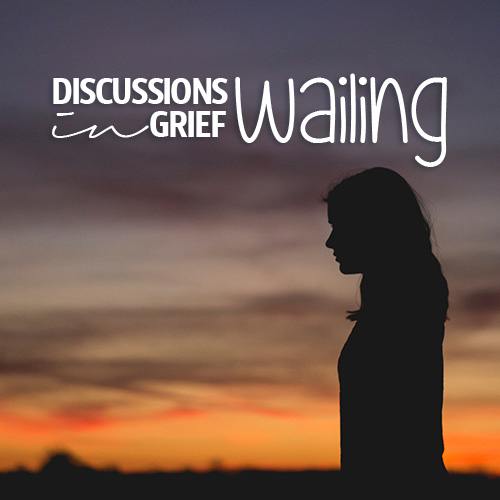Discussions in Grief: Wailing
 Grieving involves new emotions and considerations often too many to numbers. When you find yourself in overwhelming grief, you likely feel buried and lost. In this series, we slowly and compassionately look at one aspect of grief at a time from a biblical perspective for the newly grieving mother. Click {here} to read past posts in this series.
Grieving involves new emotions and considerations often too many to numbers. When you find yourself in overwhelming grief, you likely feel buried and lost. In this series, we slowly and compassionately look at one aspect of grief at a time from a biblical perspective for the newly grieving mother. Click {here} to read past posts in this series.
 About two months after Max’s death, I found myself at a dear friend’s wedding. She had just danced her father/daughter dance as her husband walked out onto the floor with his mom. I felt my chest tighten and a lump form in my throat. Then the music began, and suddenly everything inside me broke. I went from a normal wedding guest to an inconsolable, grieving mother. As the groom and his mother danced, I saw every moment I would not share with my son. I would never dance with him at his wedding. I would never take him to his first day of kindergarten or watch him take his first step. Every moment that I had so anticipated and longed for had been stolen from me. I watched this mother look so lovingly into the eyes of her son, full of pride, and I just broke. So there I sat, sobs racking my body, unable to catch a breath. My husband held me, and my friends either looked on with love and sadness or avoided looking at me altogether (certainly out of a desire to grant me privacy in that moment). I was in a room filled with a hundred or so strangers and a few close friends, experiencing my grief in a very public way. I was caught off guard in that moment and could not find a place to hide.
About two months after Max’s death, I found myself at a dear friend’s wedding. She had just danced her father/daughter dance as her husband walked out onto the floor with his mom. I felt my chest tighten and a lump form in my throat. Then the music began, and suddenly everything inside me broke. I went from a normal wedding guest to an inconsolable, grieving mother. As the groom and his mother danced, I saw every moment I would not share with my son. I would never dance with him at his wedding. I would never take him to his first day of kindergarten or watch him take his first step. Every moment that I had so anticipated and longed for had been stolen from me. I watched this mother look so lovingly into the eyes of her son, full of pride, and I just broke. So there I sat, sobs racking my body, unable to catch a breath. My husband held me, and my friends either looked on with love and sadness or avoided looking at me altogether (certainly out of a desire to grant me privacy in that moment). I was in a room filled with a hundred or so strangers and a few close friends, experiencing my grief in a very public way. I was caught off guard in that moment and could not find a place to hide.
A Poignant Snapshot of Grief
Six months after Max’s death, this is the still the most poignant snapshot of grief I’ve experienced. It truly blindsided me and forced me to confront my grief in a very public way. Before losing Max, I was the girl who would not cry in public. Honestly, I didn’t cry very often period, but I would never cry in front of people. I felt far too vulnerable, and like I should just get over it—whatever it was. If you asked me beforehand, I would have assumed I’d carry that same attitude into grieving Max, but I didn’t. By the grace of God, I always believed that my grief was valid and deserved to be felt. And if I needed to cry in public, so be it. I didn’t want to hide my grief, because that felt like I was discrediting my son’s life and the pain of losing him. Honestly, there were times when I wished I lived in a culture that believed in wailing as it was all I wanted to do, and it’s all I wanted anyone else to do.
Deep Mourning Validated
Wailing and mourning was a very important of Jewish culture as we see in the Word, and it continues to be important in many cultures throughout the world. There’s an entire book of the Bible called Lamentations, which means the passionate expression of grief or sorrow. We can see examples of the depth and value of grief throughout the Psalms as David mourns many things—persecution, sin, the frailty of his human body, and the death of his loved ones. In Jeremiah chapter 9 the Lord commands:
“Consider now! Call for the wailing women to come; send for the most skillful of them. Let them come quickly and wail over us till our eyes overflow with tears and water streams from our eyelids… Teach your daughters to wail; teach one another to lament.”
I love this passage and the way it validates a deep mourning and grieving. The Israelites were to mourn their sin before a holy God; grieving my loss of Max is different because his death was not a consequence for sin that I have committed (John 9:2-3). Yet, the way this passage teaches us to mourn so thoroughly is an image of the depths of loss we experienced when we fell, because of sin, from a close relationship with God. The loss of relationship is to be mourned. Do not let anyone shame you for the depth of grief you’re experiencing. We are meant to feel the effects of death deeply. Look to Christ as an example. When His dear friend Lazarus lay in the tomb, Jesus wept. Even though He knew that death was not the end of the story, He was brokenhearted and cried over His friend. So friend, walk freely and boldly into your grief. Don’t keep it bundled away in a nice tidy corner of your life. Feel it, and let it flow over you when you need to. As time passes, the moments of intense grief will lessen; but every now and then, it will hit. Let it. Let yourself feel it deeply.
Letting It Come
But don’t get stuck there. As Psalm 30 says, “weeping may last for the night, but joy comes with the morning.” Your grief is valid, and it is good. But nothing is good if left unchecked. Solomon reminds us in Ecclesiastes 3 that there is “a time to weep, and a time to laugh; a time to mourn, and a time to dance.” Your wailing is not meant to be indefinite. It cannot and should not last forever. It will come, and it will go. My encouragement to you is to let grieving and healing both come as they do. When you feel the grief, mourn, wail, cry out to God in your pain. And when it ebbs, embrace the joy that the Lord longs to bring.
- Sam
Hope Mom to Max and Baby Martin
Sam is a graphic designer and marketing professional in Frisco, Texas. She and her husband, Spencer, have been married since 2011, and have two children in heaven, Baby Martin (Jan 2016) and Max (Dec 2016), and two in their arms, Lachlan (Dec 2017) and Meryn (Aug 2019). They enjoy serving in their church, building community, and restoring their 100 year-old home. Sam is in two book clubs and can always be found with a book in her purse and a warm beverage in her hand.
Are you a writer who would like to join the blog team? Learn more and apply here.
Widget not in any sidebars

